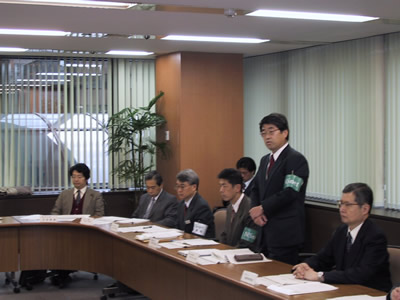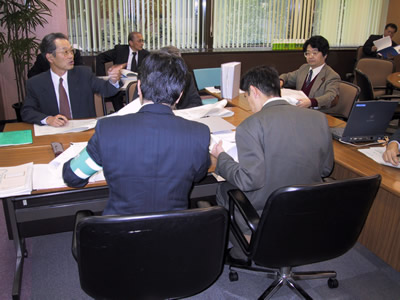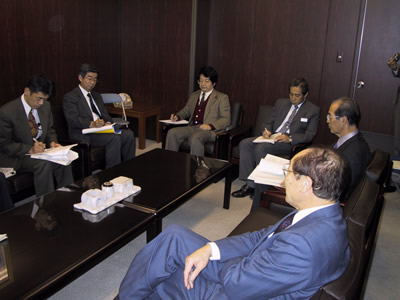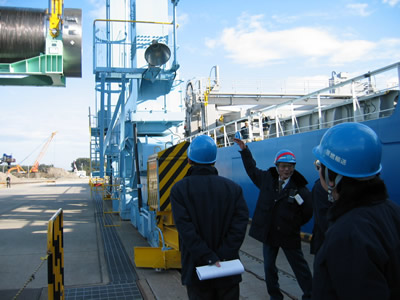|
|
 |
 During the period including December 3 and from 18 to 20, 2002, the 28th peer review was carried out at the Rokkasho Transport Operations Office (Rokkasho-mura, Kamikita-gun, Aomori Prefecture) and Head Office (Minato-ku, Tokyo) of Nuclear Fuel Transport Co., Ltd. In the peer review, Dr. Furuta, Professor, University of Tokyo, from outside NSnet membership, participated as an observer over a period of two days. We would like to introduce his opinions and impressions, which we have compiled below. During the period including December 3 and from 18 to 20, 2002, the 28th peer review was carried out at the Rokkasho Transport Operations Office (Rokkasho-mura, Kamikita-gun, Aomori Prefecture) and Head Office (Minato-ku, Tokyo) of Nuclear Fuel Transport Co., Ltd. In the peer review, Dr. Furuta, Professor, University of Tokyo, from outside NSnet membership, participated as an observer over a period of two days. We would like to introduce his opinions and impressions, which we have compiled below.
 The purport of introducing the observer this time and the contents of the observer evaluation (perspectives) have been indicated separately. The purport of introducing the observer this time and the contents of the observer evaluation (perspectives) have been indicated separately.
|
1. Introduction

|
 Since the JCO accident, these voluntary safety activities by operators have been of great importance. There is a trend in which regulations are strengthened due to power plant inspection data manipulation problems. However, I think that simply strengthening the regulations would not lead to improving safety. I issued a similar statement at the Human-Machine Systems Study Division of the Atomic Energy Society of Japan. If meaningless regulations are to be abolished, I think that these safety activities mainly carried out by operators themselves are important and I have been keeping my eyes on NSnet activities. Since the JCO accident, these voluntary safety activities by operators have been of great importance. There is a trend in which regulations are strengthened due to power plant inspection data manipulation problems. However, I think that simply strengthening the regulations would not lead to improving safety. I issued a similar statement at the Human-Machine Systems Study Division of the Atomic Energy Society of Japan. If meaningless regulations are to be abolished, I think that these safety activities mainly carried out by operators themselves are important and I have been keeping my eyes on NSnet activities.
 It was very helpful to participate at this time as an observer also for my own research. It was very helpful to participate at this time as an observer also for my own research.
|
2. Impressions regarding this peer review

|

Observer confirming openings
(left side)

Observer confirming situation of document examination (far center)
|
(1) Concerning Opening session
 After the briefing of the company by the host, no particular time was assigned for questions and answers and no managerial questions were asked by the review team. At the opening session of the peer review, I realized the limitation of peer review regarding managerial matters. However, there were subsequently in-depth discussions regarding management plants while I was observing the review. I think that the opening was good enough. After the briefing of the company by the host, no particular time was assigned for questions and answers and no managerial questions were asked by the review team. At the opening session of the peer review, I realized the limitation of peer review regarding managerial matters. However, there were subsequently in-depth discussions regarding management plants while I was observing the review. I think that the opening was good enough.
(2) Concerning document examination
 Document examination went smoothly because both the host and reviewer sides have experience through internal audits and examinations and are accustomed to the procedures. Document examination went smoothly because both the host and reviewer sides have experience through internal audits and examinations and are accustomed to the procedures.
 It appeared to me that the host side submitted some materials in advance and the reviewers checked them in advance. More time would be necessary to thoroughly examine the details of so many documents. I felt that the current practice is reasonable because greater burdens would be imposed on both the reviewers and host if the review period should be extended. However, I think it necessary to come up with better ideas, for example, conducting reviews focusing on certain points in the second round and thereafter. It appeared to me that the host side submitted some materials in advance and the reviewers checked them in advance. More time would be necessary to thoroughly examine the details of so many documents. I felt that the current practice is reasonable because greater burdens would be imposed on both the reviewers and host if the review period should be extended. However, I think it necessary to come up with better ideas, for example, conducting reviews focusing on certain points in the second round and thereafter.
 Organizational management is the foundation of safety culture. It is meaningless for the review to look at hardware only on the level of inspection. In this regard, in-depth review was conducted at this time. I was surprised that the host strived to make even its management plans open. Organizational management is the foundation of safety culture. It is meaningless for the review to look at hardware only on the level of inspection. In this regard, in-depth review was conducted at this time. I was surprised that the host strived to make even its management plans open.
 Hot issues, such as data manipulation, cannot be handled exclusively either by document examination or interviews. I consider that a combined review method of document examination and interviews would be better. Hot issues, such as data manipulation, cannot be handled exclusively either by document examination or interviews. I consider that a combined review method of document examination and interviews would be better.
 The basics for conducting emergency response in a systematic manner are to prepare manuals and implement training well in advance. However, when problems actually occur, things do not proceed as planned for in the manuals. Case-by-case judgments become vital. It is necessary to establish a system of judgment responsibilities as well as manuals. As distinctive characteristics of Nuclear Fuel Transport Co., Ltd., multiple companies, including shipper power companies, Japan Nuclear Fuel Limited, and affiliated companies are involved in transportation activities. Although they are supposed to consult with one another and notify relevant government agencies and municipalities, consulting would be time-consuming. In emergencies, there may be cases in which judgments are to be made on their own authority. Therefore, it is necessary to pay attention to who assume responsibility when accidents occur. The basics for conducting emergency response in a systematic manner are to prepare manuals and implement training well in advance. However, when problems actually occur, things do not proceed as planned for in the manuals. Case-by-case judgments become vital. It is necessary to establish a system of judgment responsibilities as well as manuals. As distinctive characteristics of Nuclear Fuel Transport Co., Ltd., multiple companies, including shipper power companies, Japan Nuclear Fuel Limited, and affiliated companies are involved in transportation activities. Although they are supposed to consult with one another and notify relevant government agencies and municipalities, consulting would be time-consuming. In emergencies, there may be cases in which judgments are to be made on their own authority. Therefore, it is necessary to pay attention to who assume responsibility when accidents occur.
 Wandering from the subject of peer review, regarding response to the mass media, while it is often criticized that press releases are issued too early, it is also criticized that press releases are issued after taking time to find out the truth. I think that there is no other way to cope with the mass media than having faith in what you do. Wandering from the subject of peer review, regarding response to the mass media, while it is often criticized that press releases are issued too early, it is also criticized that press releases are issued after taking time to find out the truth. I think that there is no other way to cope with the mass media than having faith in what you do.
(3) Concerning Interviews
 I observed interviews with the top management, including the president and executive director, and personnel in charge. I felt that it is important to conduct interviews as to find out what the top management is thinking and how the personnel in charge are performing their work in response, and that it is an indispensable review item. It appeared to me that there was a manual outlining what questions to ask. I hope that the questions will be improved in the future. I observed interviews with the top management, including the president and executive director, and personnel in charge. I felt that it is important to conduct interviews as to find out what the top management is thinking and how the personnel in charge are performing their work in response, and that it is an indispensable review item. It appeared to me that there was a manual outlining what questions to ask. I hope that the questions will be improved in the future.
 I had the impression regarding the interviews with the top management that both questions and answers were rather generalized. It would be preferable to work out better ways of finding out more specific managerial philosophy and actions of the top management. It was very good to see that questions and answers focused on specific points in the interviews with the personnel in charge on Day 2. However, I felt that the questions were too straightforward during the interviews with the personnel in charge on Day 1. When you are asked "Do you perform your work following the manuals?" it is difficult to say "No" even if you do not. If you start asking rather discretely about some factors that may cause one to deviate from the manual, for example, "Is it a lot of trouble to revise the manuals?" then the problem would become more obvious. I had the impression regarding the interviews with the top management that both questions and answers were rather generalized. It would be preferable to work out better ways of finding out more specific managerial philosophy and actions of the top management. It was very good to see that questions and answers focused on specific points in the interviews with the personnel in charge on Day 2. However, I felt that the questions were too straightforward during the interviews with the personnel in charge on Day 1. When you are asked "Do you perform your work following the manuals?" it is difficult to say "No" even if you do not. If you start asking rather discretely about some factors that may cause one to deviate from the manual, for example, "Is it a lot of trouble to revise the manuals?" then the problem would become more obvious.
 As you can see, it is an integral and indispensable part of safety management to confirm how far the personnel in charge understand and put into practice the policy decided on by the top management. As you can see, it is an integral and indispensable part of safety management to confirm how far the personnel in charge understand and put into practice the policy decided on by the top management.
(4) Concerning Field Observations and Preventing Human Error
 As to measures for preventing human errors, I felt that the review was on the level of an inspection because the host gave detailed explanations on individual measures during field observations. Measures for preventing human errors are supposed to be implemented strictly by nuclear related companies at present. I think that it would have been better to review more closely whether the mechanism in which PDCA is circulated has been established as a system. As to measures for preventing human errors, I felt that the review was on the level of an inspection because the host gave detailed explanations on individual measures during field observations. Measures for preventing human errors are supposed to be implemented strictly by nuclear related companies at present. I think that it would have been better to review more closely whether the mechanism in which PDCA is circulated has been established as a system.
|

Observers evaluating the review
(third person from the left)
|

Observer confirming conditions of field observation (right side)
|
|
3. Overall Impressions

|
(1) Opinions about Peer Review
 Including the onsite review at Rokkasho-mura, it was very good to see that the reviewers conducted the review referring to their own experience at their own companies. I think that there was useful opinion exchange based on the actual conditions at their companies, rather than looking at appearances only without knowing the situation and backgrounds. I think that it is a good point of NSnet peer review to conduct reviews based on the actual conditions at the site. Including the onsite review at Rokkasho-mura, it was very good to see that the reviewers conducted the review referring to their own experience at their own companies. I think that there was useful opinion exchange based on the actual conditions at their companies, rather than looking at appearances only without knowing the situation and backgrounds. I think that it is a good point of NSnet peer review to conduct reviews based on the actual conditions at the site.
 Overall, the level on which review is conducted should be clarified. In other words, although I recognize that NSnet peer review is to be conducted on the level of audit, I sometimes think that it is a thin line between audit and inspection. When conducting review on the level of audit, it should be checked as to whether risk management PDCA is circulated appropriately. On the other hand, when conducting review on the level of inspection, it is to check whether individual measures currently taken by the regulatory authority are appropriate. I would like to see NSnet establish a review system among companies engaged in the circle of nuclear fuel cycles. Overall, the level on which review is conducted should be clarified. In other words, although I recognize that NSnet peer review is to be conducted on the level of audit, I sometimes think that it is a thin line between audit and inspection. When conducting review on the level of audit, it should be checked as to whether risk management PDCA is circulated appropriately. On the other hand, when conducting review on the level of inspection, it is to check whether individual measures currently taken by the regulatory authority are appropriate. I would like to see NSnet establish a review system among companies engaged in the circle of nuclear fuel cycles.
 It is also important to consider what degree of strictness should be expected as well as the level of review. Peer review has the characteristics that review can be conducted up to organizational management, since peer review is conducted as a close information exchange. However, information exchange may appear to be a confidence game. As a background to this (since the definition of peer review is not fully understood), there may be an excessive expectation that companies subjected to peer review are free from dishonest practices. For example, there was a mistaken opinion that dishonest practices could be discovered by surprise inspection after the JCO accident. However, it is difficult to discover dishonest practices externally even if surprise inspections are carried out or if a considerable amount of time is spent in conducting audits. Whether it is regulation, audit, or peer review, it is necessary for both those who conduct it and those who receive it to maintain an adequate sense of seriousness to strive for voluntarily preventing dishonest practices. Thus, it is too much to expect peer review to produce the direct effect of uncovering dishonest practices, rather than an indirect effect of improving safety levels by imposing an adequate sense of seriousness on member companies. It is also important to consider what degree of strictness should be expected as well as the level of review. Peer review has the characteristics that review can be conducted up to organizational management, since peer review is conducted as a close information exchange. However, information exchange may appear to be a confidence game. As a background to this (since the definition of peer review is not fully understood), there may be an excessive expectation that companies subjected to peer review are free from dishonest practices. For example, there was a mistaken opinion that dishonest practices could be discovered by surprise inspection after the JCO accident. However, it is difficult to discover dishonest practices externally even if surprise inspections are carried out or if a considerable amount of time is spent in conducting audits. Whether it is regulation, audit, or peer review, it is necessary for both those who conduct it and those who receive it to maintain an adequate sense of seriousness to strive for voluntarily preventing dishonest practices. Thus, it is too much to expect peer review to produce the direct effect of uncovering dishonest practices, rather than an indirect effect of improving safety levels by imposing an adequate sense of seriousness on member companies.
 Although the current way of conducting peer review may not be perfect, I think it is an advanced activity that can be considered as a significant review, not as a formal activity. Even organizational management programs, which are a subject you would not want other companies to be interested in, are discussed. I think that this is what can be done only in peer review, although you need to take into account the corporate color of host companies. Although the current way of conducting peer review may not be perfect, I think it is an advanced activity that can be considered as a significant review, not as a formal activity. Even organizational management programs, which are a subject you would not want other companies to be interested in, are discussed. I think that this is what can be done only in peer review, although you need to take into account the corporate color of host companies.
 I think that it is important for the system of peer review to function properly. I think that it is important for the system of peer review to function properly.
(2) Others
 In peer reviews in the second round and thereafter, optimizing cost effectiveness, maintaining reviewers' insight and skills, fostering and securing reviewers may become an important challenge. If reviewers become an authoritative credential widely respected and recognized, review would become worth conducting. If experienced reviewers establish a support organization to polish up the system of peer review and the nuclear industry shows its good faith in striving for safety, such endeavors will be appreciated, although it may take some time. In peer reviews in the second round and thereafter, optimizing cost effectiveness, maintaining reviewers' insight and skills, fostering and securing reviewers may become an important challenge. If reviewers become an authoritative credential widely respected and recognized, review would become worth conducting. If experienced reviewers establish a support organization to polish up the system of peer review and the nuclear industry shows its good faith in striving for safety, such endeavors will be appreciated, although it may take some time.
 Transportation, which is the main business of Nuclear Fuel Transport Co., Ltd., is a field that is not being watched by the world as compared with power generation. As this was my first time to participate as an observer, I was able to understand clearly that a lot of labor, time, and costs are spent on safety. Peer review plays an important role in having the world know that these activities are being carried out. Transportation, which is the main business of Nuclear Fuel Transport Co., Ltd., is a field that is not being watched by the world as compared with power generation. As this was my first time to participate as an observer, I was able to understand clearly that a lot of labor, time, and costs are spent on safety. Peer review plays an important role in having the world know that these activities are being carried out.
 Due to the social position where the current nuclear industry stands, I think that there is no other way but to earnestly show good faith in caring for safety. I hope that peer review will be a useful social system. Due to the social position where the current nuclear industry stands, I think that there is no other way but to earnestly show good faith in caring for safety. I hope that peer review will be a useful social system.
|
4. Participation status of third-party observer (reference)
|
(1) Observer: Dr. Furuta
Position:
- |
Professor, University of Tokyo |
Main career and posts:
- |
1981: Graduated from the department of Nuclear Engineering of the Faculty of Engineering, University of Tokyo. |
- |
1986: Completed a doctoral course at the Graduate School of Nuclear Engineering, University of Tokyo (Doctor of Engineering). Became a researcher in charge of the Central Research Institute of Electric Power Industry in the same year. |
- |
1987: Lecturer of the Faculty of Engineering, University of Tokyo. |
- |
1989: Associate Professor of the Faculty of Engineering, University of Tokyo. |
- |
1988: Professor of the Graduate School of Frontier Sciences, University of Tokyo. |
- |
1983: Visiting researcher of Argonne National Laboratory. |
- |
1989: Visiting researcher of the Department of Artificial Intelligence, University of Edinburgh |
- |
Member of Human Interface Society, Japanese Society for Artificial Intelligence, Atomic Energy Society of Japan, Society of Instrument and Control Engineers, Institute of Electrical Engineers of Japan, ANS (American Nuclear Society), etc. |
Major Literature:
- |
K. Furuta, et al., Construction Method of Student Model for Training Support System of Plant Operation, Journal of Japanese Society for Artificial Intelligence, Vol. 13, Issue 5, 811-821, 1998. |
- |
K. Furuta, et al., Cognitive Process in Plant Diagnosis Using an Operator Cognitive Model, Journal of Atomic Energy Society of Japan, Vol. 38, Issue 1, 65-74, 1996. |
- |
K. Furuta, S. Kondo, An Approach to Assessment of Plant Man-Machine Systems by Computer Simulation of an Operator's Cognitive Behavior, Int. J. Man-Machine Studies, Vol.39, 473-493, 1993. |
Publications:
- |
K. Furuta, "Process Cognitive Engineering," Kaibundo, 1998. |
- |
E. Hornagel, translated by K. Furuta, "Cognitive Systems Engineering," Kaibundo, 1996. |
(2) Peer review (location)
 28th peer review (Rokkasho-mura, Kamikita-gun, Aomori and Minato-ku, Tokyo) 28th peer review (Rokkasho-mura, Kamikita-gun, Aomori and Minato-ku, Tokyo)
(3) Participation schedule
 December 3, 18 and 19 of the review term of December 3 and December 18 to 20, 2002 December 3, 18 and 19 of the review term of December 3 and December 18 to 20, 2002
|
Explanation of Terminology
Definition of peer review: Forming teams composed of member experts who conduct mutual evaluation of nuclear safety-related activities implemented by each member facility. Experts issue evaluation reports after conducting visits to facilities, document examination, interviews and thorough discussions. Identifying suggestions and good practices in order to encourage members to take an active part in the improvement of safety. |
|
|







